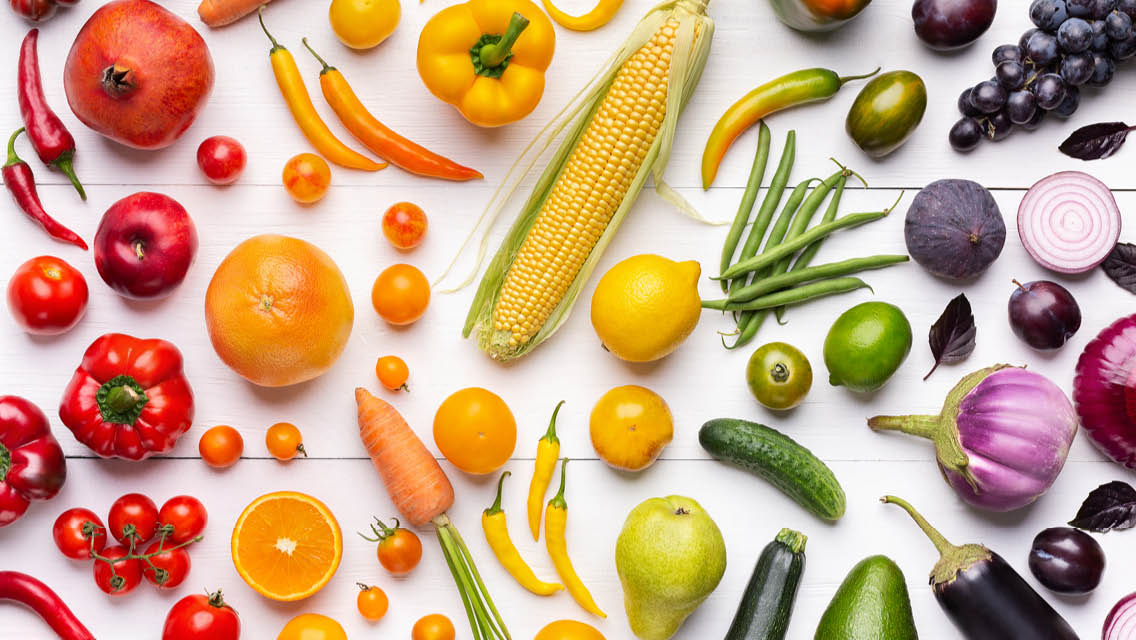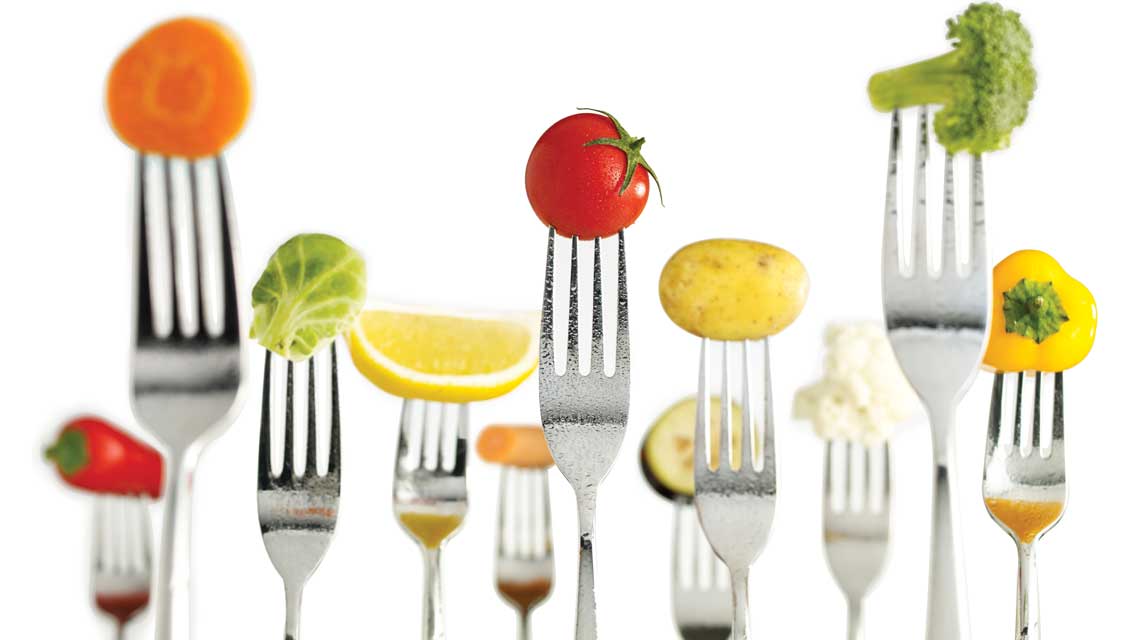Language plays a powerful role in our relationship with food. The way we talk about it becomes the way we understand it, affecting what we choose to put on our plates and how we feel about those choices.
It’s not just our own words that shape the conversation. We’re inundated with messaging from all channels: social-media influencers selling juice cleanses, billboards for drive-thru burgers that make dinner seem like a competitive sport, commercials for weight-loss programs promising that this diet is completely different from all the rest.
It’s all in the context of a food industry driven largely by profits and other corporate interests — a deeply flawed system that limits access and education for our most vulnerable citizens.
And then there are our personal food histories, including joyful memories, painful experiences, and everything in between.
When it comes to talking about food at Experience Life, we try to choose our words carefully. What follows is a glossary of some of our most frequently used food phrases. It includes language that we’ve found helpful in navigating how we eat and evolving EL’s food philosophy, plus some working definitions and notes from trusted experts we’ve worked with through the years to clarify these terms.
Our hope is that this deep dive into our vocabulary can help you better understand what we’re talking about when we talk about food — and give you some valuable insights into your relationship with it, too.
Processed food is nearly impossible to avoid. Most products available at your supermarket have been altered in some way between the farm and your plate — but that’s not necessarily a bad thing.
Canning, freezing, and pasteurizing, for instance, increase shelf life while preserving nutrients and reducing waste. Other processes, like prewashing greens or rolling oats, make it easier and more convenient for you to include these foods in your diet.
Typically, when we refer to processed food, we’re talking about products that bear little resemblance to their whole-food ingredients, or that include no whole foods at all. Items like sugary breakfast cereals, lunch meats, soda, and packaged pastries often contain hydrogenated oils, trans fats, refined sugars, artificial colorings, emulsifiers, and other substances that promote inflammation and insulin resistance.
We sometimes use terms like hyperprocessed or ultraprocessed to refer to foods that deliver few nutrients and are composed almost entirely of artificial ingredients that make them hyperpalatable and super craveable — think cheese puffs or sweet-and-sour gummy candies. “[Food scientists] chemically exaggerate certain flavors in order to create taste sensations so intoxicatingly appealing that no matter how much you devour, you feel you can never get enough,” Mark Hyman, MD, wrote for EL in 2014.
Refined carbohydrates are grains or sugars that have been processed in such a way that their nutrients have been mostly stripped out. “Refined carbohydrates, including refined grain products, are the single most harmful influence in the American diet today,” David Ludwig, MD, PhD, told EL in 2012.
Perhaps the most relevant example is all-purpose white flour, which is made from milled whole-kernel grains to make it more shelf-stable and easier to digest. But minus the fiber, flour can quickly lead to a spike in blood sugar.
“The difference between a whole-kernel grain and a [refined] grain all boils down to the glycemic index, which is how quickly the body turns food into fuel, or glucose,” Gerard Mullin, MD, FACN, told us in 2012. (For more on why whole grains are the healthier option, see “The Truth About Refined Grains“.)
Whole foods have been refined and processed either minimally or not at all; they include fresh vegetables and fruits, raw nuts and seeds, whole grains, beans and legumes, eggs, and fresh meat and fish. We try to center these foods on our own plates and in our coverage because they’re rich in vitamins, minerals, and phytonutrients that our bodies need to fight inflammation and protect against disease.
Though there is no such thing as a perfect diet, we like to follow this sensible mantra from food activist and journalist Michael Pollan: “Eat food. Not too much. Mostly plants.”
Plant based can mean different things to different people. We use this term to refer to foods found in a vegan diet: foods that contain no animal products.
We’ll often use phrases like plant forward or plant centered to denote a diet or meal that contains mostly nutrient-rich plant foods but may also contain a small amount of meat, fish, dairy, or other animal product.
Whether or not to eat meat is a personal choice, but we like Hyman’s suggestion: Think of animal products as condiments, if you choose to eat them. “Vegetables should take center stage, and meat should be the side dish,” he wrote in his 2018 book, Food: What the Heck Should I Eat?
Whatever terminology you use, eating more plants can profoundly influence your health. “If you change how you eat, you can change everything — physically, but also mentally,” Terry Wahls, MD, told EL in 2018, explaining how a vegetable-centered nutrition protocol has helped her manage her multiple sclerosis. “This way of eating gave me my life back.”
Greenwashing is a deceptive marketing strategy used to imply that products are healthy or environmentally friendly without supporting the claim. If you’ve ever seen terms like “all-natural” or “farm-raised” on products in your grocery store, you’ve witnessed greenwashing in action. These phrases have no legal definition or certification, but they can inspire you to feel like you’re making a healthy, responsible purchase. (For more on decoding food labels, see “How to Read Food Labels“.)
Diet culture is a belief system that prioritizes body weight, shape, and size over health and well-being. We all experience diet culture differently, due to differing degrees of privilege like body type or socioeconomic status — but it’s pervasive in American culture. It can fuel negative body image and encourage dangerous weight-loss behaviors.
In her book Anti-Diet, Christy Harrison, MPH, RD, writes that diet culture “is very much a system of oppression, with its roots in racist, sexist beliefs about food and bodies.
. . . [It] has become the default point of view in Western society — the water we’ve all been swimming in since birth, without realizing it.”
One of the effects of diet culture is weight stigma, which manifests as discrimination against or stereotyping of people in larger bodies, conflation of fatness with sickness, or a belief that fatness is somehow a moral failing.
“The bias against larger bodies is not based on health,” Ander Wilson, MS, RDN, LDN, told EL in 2020, “and we have to unpack that because it gets in the way of people getting proper healthcare, diagnoses, and treatment.” (For more on why health is about more than weight, see “Beyond BMI: Why True Health Is About More Than What You Weigh“.)
Food deserts are communities with limited access to affordable, nutritious food. This includes rural areas where grocery stores are rare or nonexistent, as well as urban neighborhoods, where corner stores may sell candy, sodas, and other ultra-processed products, but virtually no fresh, healthy whole foods.
Leah Penniman, author of Farming While Black: Soul Fire Farm’s Practical Guide to Liberation on the Land, credits community activist Karen Washington for introducing the phrase food apartheid. “The challenge with [‘food desert’] is that a desert implies a natural ecosystem,” Penniman told us in 2020. “‘Food apartheid,’ on the other hand, more accurately describes what we have: a human-created system of segregation that designates certain people for food opulence and relegates others to food scarcity. It’s based on a legacy of institutional racism.” (For more on Penniman’s mission to debunk myths about Black people’s relationship to the land, see “The Audacity to Farm“.)
Eat Your Words
The language we use to describe food and our eating habits, as well as our feelings about them, can influence our self-perception and sense of worth. “When we eat and feel terrible about ourselves, that’s driven by the false belief that food is the enemy,” Marc David, MA, author of The Slow Down Diet, told EL last year. “And that’s driven by the false belief that your body isn’t lovable and isn’t good enough as it is. We really have to let go of that toxic messaging and learn to see the world through different eyes.”
Because we find that some common food-related phrases encourage moral judgments about our food choices and, in turn, ourselves, we have changed some of the language we use to talk about food over the years. These are a few of the phrases we now try to avoid:
- Clean eating
- Cheat day
- Guilt-free
- Guilty pleasure
- Empty calories
- Fattening
This article originally appeared as “Food Glossary” in the May 2021 issue of Experience Life.





This Post Has 0 Comments